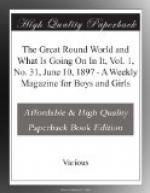A great many people are sorry that the Senate has passed the resolution. They insist that those who are in favor of helping Cuba are foolish people, who do not realize that this resolution, if indorsed by the House of Representatives, and approved by the President, will plunge the country into war with Spain.
They declare that it is only an outburst of Jingoism, which should be promptly crushed.
Jingoism has become such a common word in politics to-day, that it may amuse you to know just how it came into use, and what it means.
In 1877, during the Russo-Turkish war, there was a very strong party in England which was in favor of helping the Turks against the Russians. They urged the Government, which was under Lord Beaconsfield (the great Disraeli), to go to the aid of the Turks, and make war on the Russians, who were advancing on Turkey, and it was feared might take the city of Constantinople.
The outcry for this legislation became so strong that men’s minds were full of it. Every paper had something to say on the subject, in every pulpit and every theatre allusions were made to the absorbing topic of the hour, and it seemed as if war must be the outcome. In the midst of this excitement a song appeared, the words of which ran:
“We don’t
want to fight, but, by Jingo, if we do,
We’ve got the ships, we’ve
got the men, we’ve got the money too.
We’ve fought the Bear before, and
while we’re Britons true,
The Russians shall not
have Constantinople!”
This verse so exactly suited the feelings of the people that they went wild over it. It was sung everywhere, until finally the mere whistling of the air was enough to rouse a frenzy of patriotism and a thirst for war.
One day, during a heated discussion in Parliament, a member alluded to a previous speaker, who had declared himself in favor of supporting Turkey, as “one of the ‘by-Jingo-if-we-do’ party.”
From that moment the war party was christened the Jingo party, the men who belonged to it were called Jingoes, and the platform of the party was “Jingoism.”
The Russo-Turkish war came to an end, but the word lived on, and now, twenty years after, we find it in use in our own country, and applied to our own politics. The word has in fact become a part of our language, and is incorporated in our modern dictionaries.
The quieter people insist that there is a great deal of Jingoism in the United States Senate to-day, and that the people who clamor for the recognition of Cuba are Jingoes, who want war with Spain. Many people think that the proper course for us to pursue is to let Spain settle her own affairs her own way.
Every one is most anxious to know what the President intends to do about Cuba.
It is asserted that he is not at all in favor of the Morgan resolution. He wants to end the war, but he does not think that is the right way to go about it. It is said that he will endeavor to bring about a peaceful settlement of the matter by suggesting that the Cubans be given the right of absolute self-government, in return for a sum of money which they shall pay to Spain for her expenses of the war.




